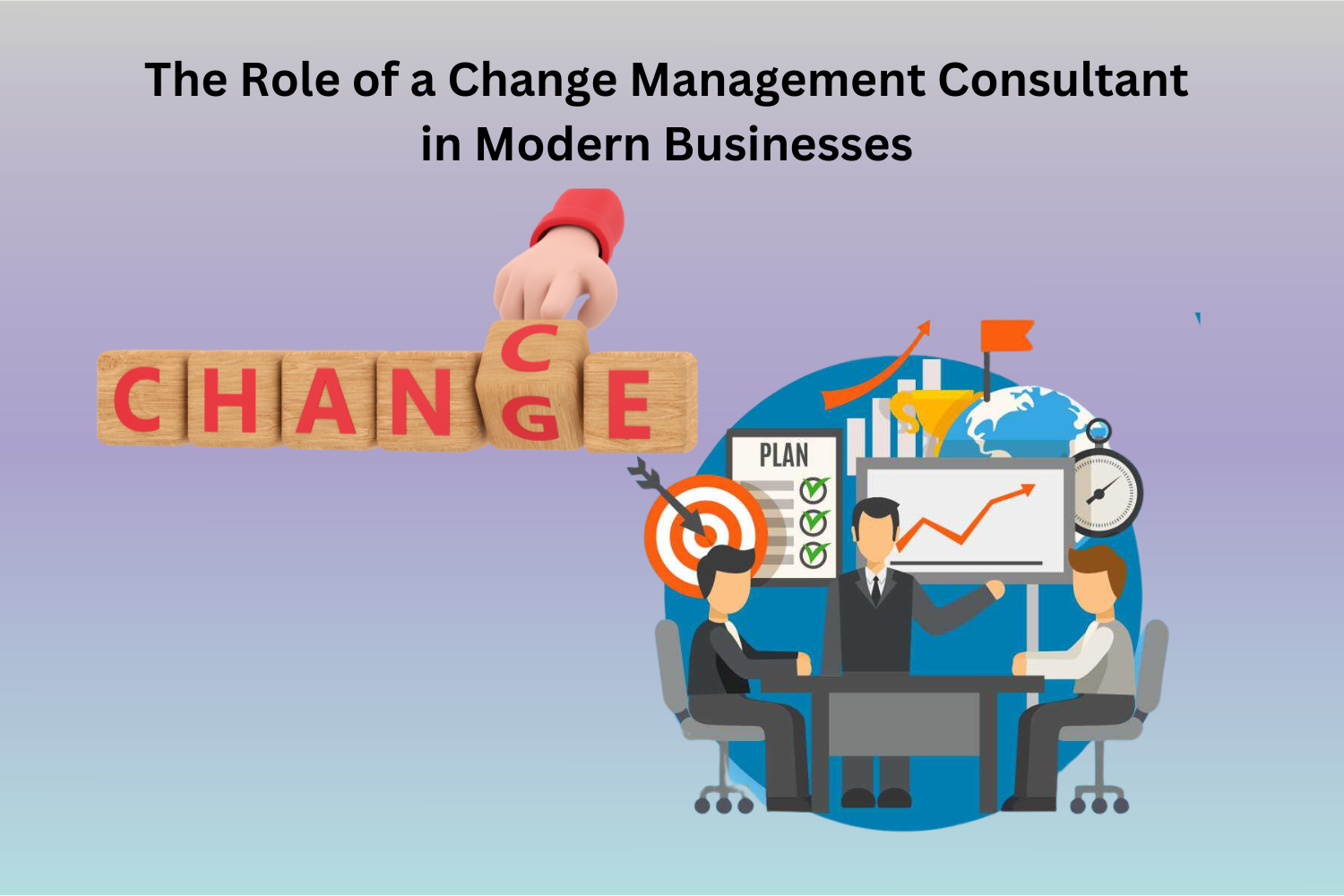Education
The Role of a Change Management Consultant in Modern Businesses

The corporate world of today moves quickly, and change is not only unavoidable but also required. Organisations need to adapt if they are to stay relevant. Professionals looking to improve their abilities and reputation in this area are increasing the demand for Change Management Certification Online. To become a change management consultant, one must have experience guiding companies through times of transformation, assisting them in navigating obstacles and achieving their strategic goals. In this blog, we will investigate the role of a Change Management Consultant in modern business.
Assessing the Landscape
Change management experts are crucially responsible for evaluating an organisation’s change readiness. This involves a thorough examination of the situation, identification of possible obstacles, and planning of solutions. Comprehensive assessments enable experts to foresee and reduce hazards, facilitating a seamless transfer.
Communication as the Compass
Effective communication is the foundation of any transformation project. Change management experts must communicate the justifications for the change, its advantages, and its expected effects on staff members and the company. Success depends critically on tailoring messages to various audiences and making sure everyone is aware and involved.
Training and Development as Fuel
Many times, change requires learning new things. The training programmes that change management consultants create and implement give staff members the skills they need to adjust. Investing money in training and development guarantees that staff members are prepared to accept change and advance the company.
Guidance and Support
Change management experts help staff members and executives continuously through the transformation process. Addressing objections and concerns and guiding people through the emotional parts of change maintains momentum and guarantees the change project remains on course.
A Catalyst for Success
Fundamentally, consultants in change management are success accelerators for organisations. By evaluating readiness, creating thorough strategies, communicating clearly, and offering assistance and training, they enable businesses to manage change successfully. This not only ensures that change projects succeed but also strengthens organisations.
Celebrating Success and Learning from Challenges
Change management experts greatly aid in recognising accomplishments and learning from setbacks. By recognising and appreciating accomplishments, consultants can encourage staff members to keep accepting change and maintain good habits. Likewise, advisors enable companies to grow stronger in the face of future change by considering difficulties and pinpointing areas for development.
Adapting to Change
Consultants in change management need to be flexible. The corporate environment is always changing, so consultants need to keep up with new developments and industry best practices. By always learning and developing, consultants may guarantee they are ready to assist companies in navigating even the most complicated and unforeseen developments.
Building a Culture of Change
Change management consultants are ultimately essential to creating a change-oriented culture inside businesses. Consultants can assist companies in remaining flexible and adaptable in the face of change by encouraging an innovative and always improving attitude. The long-term advantages of this cultural change include ensuring that companies are ready to succeed in an evolving world.
Measuring and Evaluating Impact
Evaluating and quantifying the results of change projects is the domain of change management consultants. Consultants can assess the success of their plans and make necessary changes by identifying important performance metrics and monitoring their achievements. This systematic use of data guarantees that transformation projects are viable and successful in the long term.
Utilising Technology for Change
Technology is a major force behind change. Change management consultants use technology to improve communication, simplify procedures, and promote teamwork. By applying technology, consultants may assist companies in more successfully and efficiently achieving their change goals.
Continuously Improving Change Management Practices
Another duty of change management consultants is to improve organisational change management practices. By assessing the success of their plans and identifying areas for development, consultants can assist companies in being more flexible and adaptable to change.
Conclusion
A change management consultant performs a complex and vital function in contemporary companies. Using the information from this blog consultants assist organisations is smoothly negotiating change and coming out stronger and more resilient. The need for change management consultants to promote organisational success cannot be emphasised since change is an ongoing process in the business sector. For more information visit: The Knowledge Academy.
Education
A Guide to Progressive Math Learning for Skill Enhancement of Students

Are you looking to boost your child’s math skills? Progressive math learning is essential for skill enhancement. It helps enhance students’ math abilities.
This guide aims to simplify math learning steps. Each stage builds upon the previous one. The approach is structured and easy to follow.
Why is skill enhancement important in math? Strong math skills offer better problem-solving strategies. It also ensures analytical thinking develops over time.
The guide includes practical tips. These are designed for all learning levels. Dive in to discover simple methods to improve math skills.
Start With the Basics
Starting with the basics is the foundation of learning math. Begin by ensuring that students understand simple arithmetic like:
- addition
- subtraction
- multiplication
- division
These are the building blocks of all future math concepts. Use real-life examples to show how math is part of everyday activities. Practice counting with objects like fruits or toys to make learning fun.
Repetition and practice are key to mastering these basic skills. Encourage students to solve simple problems. It is to build their confidence and establish a strong mathematical foundation.
Use Visual Aids
Using visual aids makes math more understandable and engaging for students. Visual aids like charts, diagrams, and drawings help to illustrate math concepts.
For example, use pie charts to explain fractions or bar graphs to show data comparison. Interactive tools like math puzzles or educational videos can also be very effective.
Visual aids cater to different learning styles and can make abstract ideas more concrete. Incorporating these tools in lessons can simplify complex topics.
Make It Fun and Relatable
Making math fun and relatable is crucial for keeping students engaged. You can achieve this by incorporating games and real-life scenarios into math lessons. For instance, use board games or apps that involve math challenges to keep students interested.
Relate math problems to everyday activities, such as shopping or cooking, to show its practical use. The StudyPro Math Coaching offers several fun activities that make math enjoyable and easy to understand. By connecting math to real-life situations, students can see its importance and are more likely to enjoy learning it.
Encourage Practice
Encouraging effective math practices is essential for mastering math skills. Regular practice helps students remember and understand math concepts better. Set aside time each day for math exercises to make practice a habit.
Use worksheets, online resources, or math apps to provide varied and interesting activities. Challenge students with puzzles and real-world problems to keep their minds active.
Praise their efforts to build confidence and motivate them to continue practicing. Consistent practice makes a difference in becoming proficient in math.
Personalize Learning
Personalize learning to meet the unique needs of each student. Understand that every student has different strengths and weaknesses in math.
Offer tailored exercises that address individual challenges. Provide math learning resources like:
- interactive apps
- games
- worksheets
It can adapt to different levels of understanding. Personalizing learning makes math more accessible and boosts student confidence.
Consider This Guide to Progressive Math Learning for Skill Enhancement of Students
Skill enhancement in math is vital for students’ success. Using math learning resources makes the learning process more effective. Start with the basics to build a strong foundation.
Use visual aids to make concepts clearer and more engaging. Make math fun by linking it to real-life situations. Encourage consistent practice to keep and understand concepts better.
Personalize learning to address individual student needs. With this guide, math can become a more enjoyable subject.
Did you find this article helpful? If so, check out the rest of our site for more informative content.
Education
How G1 practice tests are beneficial to the actual test?

Acquiring a driving license in Ontario might seem easy. But in reality, passing the pre-requisite examination may cause hiccups if you are not well-prepared, especially for the G1 examination. Focusing on scrutinizing the knowledge of the candidates, the test results show if you are aware of the basic safety measures, traffic rules, and other related facts.
According to a news report from CBC, the average passing rate of driving tests across the entire state of Ontario is merely 69%. That’s because the state government pays special attention to the evaluation of the candidates’ driving knowledge and skills through a series of examinations. Out of these, the G1 test is of pivotal importance as it acts as the deciding factor for your ability to acquire a driving license.
So, rather than sitting for the examination straightaway without any prior knowledge, it would be best to invest in a G1 practice test. Truth be told, it will not only help you gain more confidence but also help you prepare yourself pretty well for the actual test. But is that all? Taking the G1 mock test has much higher profitability than you can comprehend. To know more about the same, read on to this illustration below explaining the importance of giving a G1 practice test before the real examination.
Familiarity with the exam pattern
The G1 test is divided into two sections: the first part considers traffic rules and regulations, while the second part is based on road rules. While the topics do not have a much broader scope, you still need a template to understand what the actual examination paper looks like. This is where the G1 practice test comes into the picture. It will allow you to become more familiar with and well-versed in the examination patterns, questions that are usually asked, and other facts related to the actual test. With familiarity, you can prepare yourself well enough for the real test and ace the exam with flying colours.
Fulfilling knowledge gaps
You wouldn’t know if you have any knowledge gaps unless you sat for the G1 examination and evaluated your results. Rather than relying on the actual test, you can give the mock one and understand the loopholes existing in your learning about road rules, traffic lights, and traffic regulations. Truth be told, you won’t have anything at stake when you appear for the practice test for G1, which is why failing won’t matter. But it will indeed help you understand your shortcomings and give you a chance to refine your knowledge and study more for the real exam.
Boosts confidence
Most often, people’s confidence starts wavering once they feel that they are not competent enough to clear the actual G1 examination. It mainly happens once they fail to score the expected marks in the real test. Losing confidence is not at all good, and it can cause hurdles in acquiring a driving license in Ontario. That’s why taking a G1 practice test seems to be a feasible option. With this, you can gain more confidence in your knowledge and refine your learning by preparing well for the real test. In fact, your chances of passing the exam with a higher score will be enhanced by several notches once you appear for the practice test.
Developing necessary skills
From time management to concentration, there are several attributes that matter when you are appearing for an examination, especially G1. Developing these skills merely through luck won’t be enough to help you have the ball in your court during the real test. So, it would be best if you sat for the practice G1 examination and focused on developing your time management and concentration skills.
Conclusion
Now that we have illustrated the benefits of taking the G1 practice examination, you shouldn’t ponder over your thoughts much. Taking it will help you in numerous ways, not just boost your confidence. But you should choose a proper centre that adheres to the examination rules and prepares the candidates well for the real Ontario driving test. By doing so, you can ensure a smoother path towards acquiring your driving license and navigating the roads with confidence and competence.
Education
The Importance of Lean Manufacturing Training in Employee Development

In today’s competitive business landscape, efficient processes define success. Lean manufacturing is more than just a buzzword. It’s a critical strategy that transforms waste into value and boosts productivity.
Investing in lean manufacturing training equips employees with vital skills. It streamlines operations, reduces costs, and fosters continuous improvement. Sounds great, right?
But why are these efficiency training programs important in employee development? Let’s find out!
Enhances Problem-Solving Skills
Employees learn to recognize waste and find solutions to eliminate it. This skill is crucial for smooth operations. It also encourages creativity and critical thinking.
Additionally, workers feel empowered to take initiative and make decisions. Over time, this leads to a more efficient and proactive team.
Promotes Teamwork and Collaboration
This training promotes teamwork and collaboration. Employees work together to identify and implement production optimization techniques.
This teamwork boosts communication and builds a stronger, cohesive team. By sharing knowledge and ideas, team members can solve problems more effectively.
Not only that! Collaboration also creates a sense of accountability. Each team member contributes to the organization’s success.
Increases Job Satisfaction and Engagement
With this training, employees gain new skills and feel more competent. They appreciate the investment in their development. This can lead to higher morale and job happiness.
Additionally, engaged workers are more productive. They care about their tasks and perform better. When employees see the results of their efforts, they feel valued.
This recognition boosts their engagement and loyalty to the company.
Fosters Continuous Improvement
Workers are encouraged to test processes and seek advancements. By focusing on lean process improvement, they can make small changes for big results.
This practice of ongoing assessment and refinement drives operational excellence. Here, teams also learn to adapt quickly to new challenges. They also become more resilient in the face of change.
With this mindset, employees become valuable assets to any organization. They can identify and address inefficiencies, leading to long-term success.
Emphasizes Ergonomic Manufacturing
Ergonomic manufacturing focuses on designing workspaces and processes to fit employees’ needs. Its goal is to reduce physical strain and prevent injuries.
This can boost productivity and job satisfaction. This can be simple changes like:
- adjustable workstations
- ergonomic tools
- redesigning layouts
Moreover, implementing these practices shows a company cares about employee well-being. It helps retain talent and lowers healthcare costs from injuries.
Remember, an ergonomic workplace supports a healthier, happier, and more efficient workforce.
Boosts Adaptability to Change
With this training, employees learn to embrace change and see it as an opportunity. This mindset is important in a fast-paced business world.
Also, having the right skills allows workers to adjust processes quickly. This keeps the company competitive.
Being adaptable means employees are always ready to improve. They can spot areas for enhancement and act on them. This leads to continuous growth and success for the company.
Perks of Lean Manufacturing Training for Employee Development
Lean manufacturing training is an investment in your employees. It fosters skills that drive efficiency and innovation. Plus, it sets the stage for long-term success.
Don’t wait! Start your journey towards a more efficient and empowered team today! Your employees will thank you for it.
Did you find this article helpful? Check out the rest of our blog now!

 Business3 months ago
Business3 months agoTex9.Net Crypto: Fast, Secure International Money Transfers with Competitive Rates

 Entertainment2 months ago
Entertainment2 months agoSandra Orlow: Exploring the Life and Legacy of a Cultural Icon

 General1 week ago
General1 week agoBaby Alien Fan Bus: Watch Parts 2 & 3 on Twitter, Reddit!

 General1 week ago
General1 week agoDiana Nyad & Bart Springtime: A Swim to Success

 Business3 months ago
Business3 months agoSnapchat Planets: Exploring Your Streak Universe

 General1 month ago
General1 month agoDeeper Dive into myfavouriteplaces. org:// blog

 Business3 months ago
Business3 months agoFintechZoom Apple Stock: Real-Time Insights and Expert Analysis

 Entertainment3 months ago
Entertainment3 months agoUnlock Your Fantasy: Dive into Coomer Party Free OnlyFans Leaks!
















